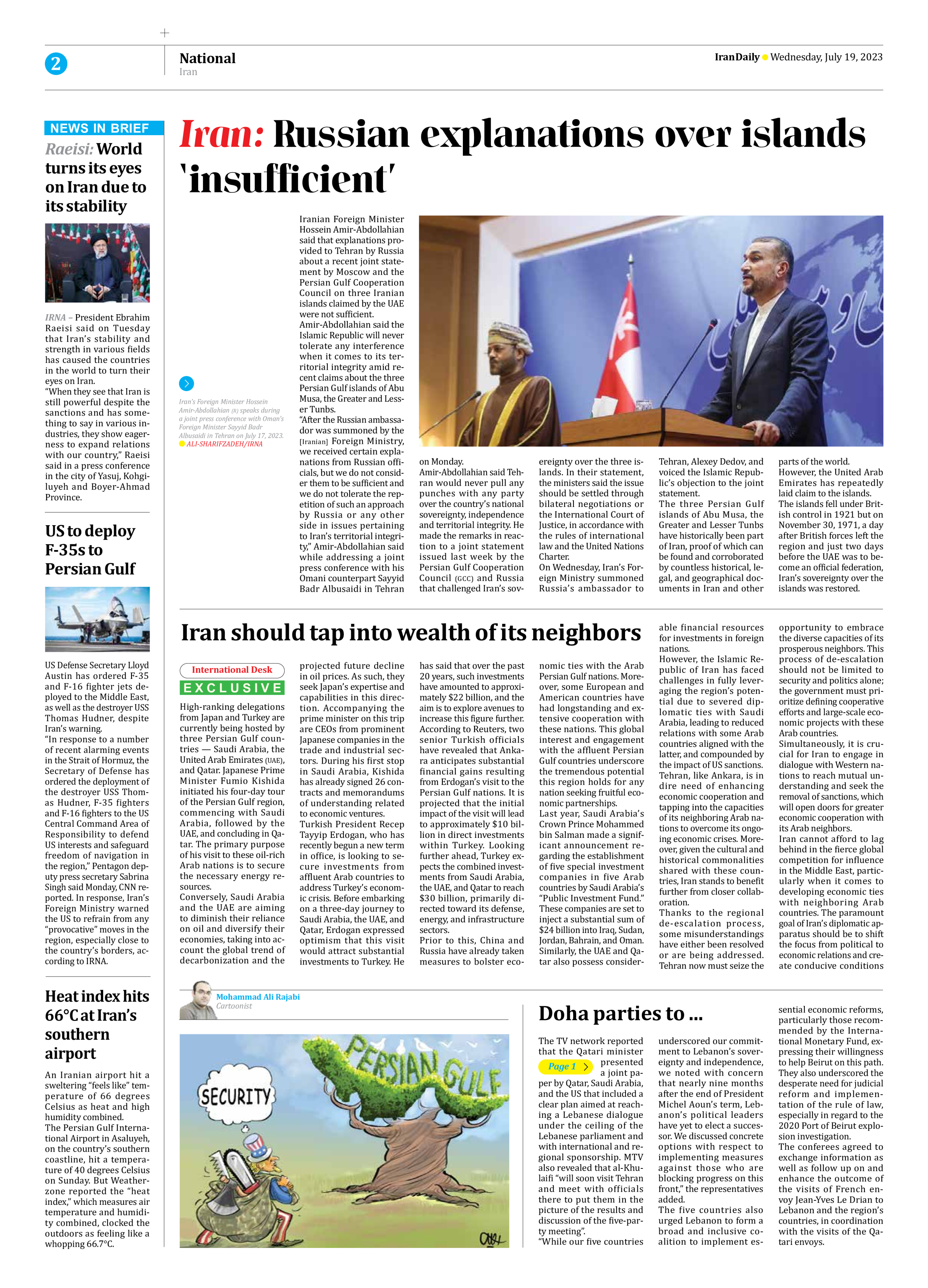
Iran should tap into wealth of its neighbors
High-ranking delegations from Japan and Turkey are currently being hosted by three Persian Gulf countries — Saudi Arabia, the United Arab Emirates (UAE), and Qatar. Japanese Prime Minister Fumio Kishida initiated his four-day tour of the Persian Gulf region, commencing with Saudi Arabia, followed by the UAE, and concluding in Qatar. The primary purpose of his visit to these oil-rich Arab nations is to secure the necessary energy resources.
Conversely, Saudi Arabia and the UAE are aiming to diminish their reliance on oil and diversify their economies, taking into account the global trend of decarbonization and the projected future decline in oil prices. As such, they seek Japan’s expertise and capabilities in this direction. Accompanying the prime minister on this trip are CEOs from prominent Japanese companies in the trade and industrial sectors. During his first stop in Saudi Arabia, Kishida has already signed 26 contracts and memorandums of understanding related to economic ventures.
Turkish President Recep Tayyip Erdogan, who has recently begun a new term in office, is looking to secure investments from affluent Arab countries to address Turkey’s economic crisis. Before embarking on a three-day journey to Saudi Arabia, the UAE, and Qatar, Erdogan expressed optimism that this visit would attract substantial investments to Turkey. He has said that over the past 20 years, such investments have amounted to approximately $22 billion, and the aim is to explore avenues to increase this figure further.
According to Reuters, two senior Turkish officials have revealed that Ankara anticipates substantial financial gains resulting from Erdogan’s visit to the Persian Gulf nations. It is projected that the initial impact of the visit will lead to approximately $10 billion in direct investments within Turkey. Looking further ahead, Turkey expects the combined investments from Saudi Arabia, the UAE, and Qatar to reach $30 billion, primarily directed toward its defense, energy, and infrastructure sectors.
Prior to this, China and Russia have already taken measures to bolster economic ties with the Arab Persian Gulf nations. Moreover, some European and American countries have had longstanding and extensive cooperation with these nations. This global interest and engagement with the affluent Persian Gulf countries underscore the tremendous potential this region holds for any nation seeking fruitful economic partnerships.
Last year, Saudi Arabia’s Crown Prince Mohammed bin Salman made a significant announcement regarding the establishment of five special investment companies in five Arab countries by Saudi Arabia’s “Public Investment Fund.” These companies are set to inject a substantial sum of $24 billion into Iraq, Sudan, Jordan, Bahrain, and Oman. Similarly, the UAE and Qatar also possess considerable financial resources for investments in foreign nations.
However, the Islamic Republic of Iran has faced challenges in fully leveraging the region’s potential due to severed diplomatic ties with Saudi Arabia, leading to reduced relations with some Arab countries aligned with the latter, and compounded by the impact of US sanctions.
Tehran, like Ankara, is in dire need of enhancing economic cooperation and tapping into the capacities of its neighboring Arab nations to overcome its ongoing economic crises. Moreover, given the cultural and historical commonalities shared with these countries, Iran stands to benefit further from closer collaboration.
Thanks to the regional de-escalation process, some misunderstandings have either been resolved or are being addressed. Tehran now must seize the opportunity to embrace the diverse capacities of its prosperous neighbors. This process of de-escalation should not be limited to security and politics alone; the government must prioritize defining cooperative efforts and large-scale economic projects with these Arab countries.
Simultaneously, it is crucial for Iran to engage in dialogue with Western nations to reach mutual understanding and seek the removal of sanctions, which will open doors for greater economic cooperation with its Arab neighbors.
Iran cannot afford to lag behind in the fierce global competition for influence in the Middle East, particularly when it comes to developing economic ties with neighboring Arab countries. The paramount goal of Iran’s diplomatic apparatus should be to shift the focus from political to economic relations and create conducive conditions for enhanced economic cooperation while utilizing the existing capacities of neighboring nations.







